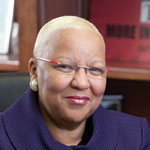SUPER CAMPAIGN
The high achievement and affordability of UMBC makes the university an attractive option for high school students. But a university built on innovation is always looking to do the job better.
Enter a creative team led by UMBC associate director of marketing Erika Ferrin, Creative Services designer Erin Ouslander ’03 and marketing director Ed Neenan. Together, they created a new advertising campaign depicting high-flying UMBC students in the humanities and social sciences as superheroes using both their brainpower and their desire to enact positive changes in their own lives and the lives of others. The campaign used images and lettering familiar to fans of graphic novels to tell the stories of students including Naomi Jackson ’11, Curtis Schickner ’12, Stefanie Mavronis ’12 and Kimberly Browning ’13 (pictured, left to right, above).
Market research led Ferrin to narratives such as the Twilight and Harry Potter books and films where “smart was considered cool” and in which “normal kids use extraordinary powers to change the world.” The campaign appeals “to an upcoming generation of students coming to UMBC ready to change the world. We want them to know: We’re ready for you.”
The campaign is already helping to attract those super students to UMBC. And it’s also been recognized for its excellence by the university’s peers. The Superheroes campaign won the 2011 gold medal from the Council for the Advancement and Support of Education’s Second District – which covers the Mid-Atlantic region of the United States.
— Richard Byrne ’86
R. SARGENT SHRIVER, 1915-2011
As UMBC Magazine was in its final stages of editing this issue, we received the sad news that R. Sargent Shriver had passed away.
Shriver’s career as an inspiring and innovative leader was a vibrant model of selfless public service. Many who do not follow politics know of his role – in collaboration with his late wife, Eunice Kennedy Shriver – in founding the Special Olympics. The list of his accomplishments as a politician and a diplomat is daunting and included key elements of the “War on Poverty”: the Peace Corps, Head Start, Job Corps, VISTA and Legal Services for the Poor. Shriver was also a vice-presidential candidate in 1972.
Shriver had a special connection with UMBC. UMBC’s Shriver Center, founded in 1993, is named after him and the late Mrs. Shriver. He helped craft the Center’s original mission statement and put together its first national advisory board. The Shriver Peaceworker Program and the Shriver Living Learning Community in Erickson Hall also loom large in Shriver’s campus legacy. In a joint statement, UMBC President Freeman A. Hrabowski, III, and Shriver Center founder John Martello stated it simply on behalf of the UMBC community: “The Shrivers were our supporters and our friends.”
In his 2004 biography, Sarge, Scott Stossel observed a key similarity between Shriver and John F. Kennedy, the president with whom he achieved so much of note: “[T]he two men shared a great gift: the ability to expand the horizons of the possible, to change our sense of what we can accomplish as individuals and as a nation.”
— Richard Byrne ’86
BREAKING GROUND
The bright sunshine on Friday, September 17 perfectly reflected the mood on campus on a landmark day in UMBC’s history.
On that afternoon, elected officials, leaders of the University System of Maryland and key university philanthropists joined with a broad cross-section of the campus community to break ground on a much-anticipated $170 million Performing Arts and Humanities Building.
The ceremony demonstrated the strength of the bridges that the university has built with local and state government, which helped secure funding for the project. “I’ve never been as happy to see a giant hole in the ground, giant mounds of dirt, and big noisy machines as I have been this summer,” quipped John Jeffries, dean of the College of Arts, Humanities and Social Sciences.
But much of the ceremony was devoted to strong affirmations of the importance of arts and humanities on UMBC’s campus and in society at large.
University System of Maryland Chancellor William Kirwan observed that “we have an obligation to make sure our graduates have both the skill they need to compete in the workplace and the cultural and intellectual underpinning necessary for an enlightened and progressive society. This is an obligation UMBC has clearly embraced.”
The building will be constructed in two phases. The first phase – which will open in Fall 2012 – will include the departments of English and theatre, new offices for the James T. and Virginia M. Dresher Center for the Humanities, the Humanities Scholars Program and the Linehan Artist Scholars Program and two theaters: a 275-seat main theater and a 100-seat black box theater.
The second phase, which will break ground in the future, will include new dance and concert halls, and a new home for the departments of music, dance, philosophy and ancient studies. The building will be the second LEED Silver-certified building on campus, joining a new addition to the Patapsco Residence Hall.
“We’re celebrating the beginning of a new chapter for the University of Maryland, Baltimore County,” said Maryland Governor Martin O’Malley. “The new Performing Arts and Humanities Building is a true investment in the talents, skills, creativity, ingenuity and education of our people. Its ‘green’ design will help develop a more sustainable environment, and in these tough economic times, its construction will provide much-needed jobs for our hardworking families. Together, we can continue to nurture our students’ talents and gifts while providing them with the tools they need to build a better future.”
In concluding the ceremony, UMBC’s president Freeman A. Hrabowski, III observed that “the arts and humanities really are the soul of our society and the soul of this campus. We teach people how to live… and the values they need in a society – when it’s going well and when it’s not going well. The reason [our elected officials] can say let’s support this is that they understand that in the worst of times, we need to remember what it means to be human.”
— Richard Byrne ’86
Tags: Winter 2011



